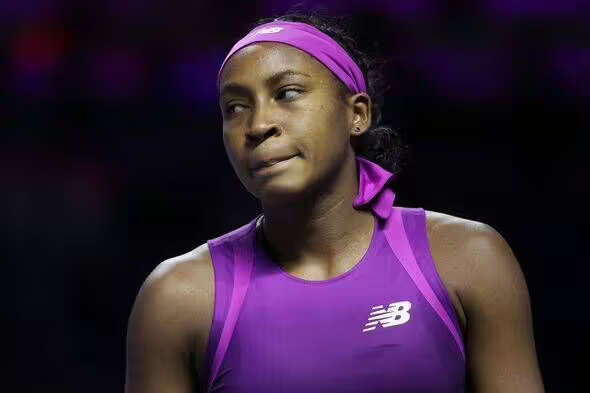
Coco Gauff, the 19-year-old tennis sensation who recently made headlines for her triumph at the WTA Finals, has been drawn into controversy after her final Orange Group match led to the elimination of top rival Iga Swiatek from the tournament. Despite Gauff’s stellar run in Cancun, which ended with her lifting the championship trophy, some tennis fans have accused her of intentionally underperforming against Barbora Krejcikova to block Swiatek’s progression to the semi-finals—a claim fiercely disputed by experts and Gauff’s supporters.
The WTA Finals employ a round-robin format where eight competitors are divided into two groups, with the top two from each group moving on to the semi-finals. Gauff started the tournament strongly, defeating Swiatek in their second encounter of the group stage, a win that solidified her position as a serious contender for the title. However, Gauff’s subsequent loss to Wimbledon champion Barbora Krejcikova complicated matters for Swiatek, who needed Gauff to win her match to have a chance at advancing. The outcome left Swiatek, one of the world’s most consistent players, out of the tournament—a turn of events that spurred speculation among some fans that Gauff may have intentionally eased up on her efforts.
The narrative gained traction online, with some suggesting that Gauff’s loss was strategically motivated, perhaps to avoid facing Swiatek again or to gain a perceived competitive edge later in the tournament. Such claims, however, overlook the complexities and pressures inherent in high-stakes tennis, where every match can turn on a few points and players compete not just for trophies, but also for rankings, prize money, and pride.
Rennae Stubbs, former doubles World No. 1 and renowned tennis commentator, has come to Gauff’s defense, slamming the idea that the young American intentionally underperformed. Speaking on her podcast, Stubbs dismissed the accusations as “ludicrous” and highlighted the financial and professional incentives that would have made such a move illogical for Gauff. “Somebody wrote about, ‘Coco tanked the match against Krejcikova so Iga couldn’t get through to the semi-finals,’” Stubbs said, clearly frustrated by the rumor. “No, that’s not how it works.”
Stubbs elaborated on the motivations at play for Gauff, emphasizing that the prize structure of the WTA Finals offers substantial bonuses for undefeated performances. “If you go undefeated, you get an extra bonus,” Stubbs explained. “No way, that’s not what she’s thinking. She’s thinking, ‘I want to win again, I want to get more money into my pocket.’” In short, Gauff had every reason to give her best effort, not to mention the professional drive to maintain momentum going into the semis.
Gauff’s journey through the WTA Finals was anything but simple, marked by high-intensity matches and the unpredictable dynamics of a format that can produce dramatic twists. The stakes were particularly high in Cancun, with Jessica Pegula’s withdrawal mid-tournament causing a reshuffling of the player line-up. This introduced Daria Kasatkina as a replacement, altering the complexion of the Orange Group and intensifying the pressure on every remaining match. Gauff had already secured her place in the semifinals by defeating Swiatek earlier, but Krejcikova’s formidable skill and hunger to progress added further complexity to their encounter.
Despite the loss to Krejcikova, Gauff’s overall performance at the Finals was a testament to her growth and resilience as a player. The accusations leveled against her ignore not only her professionalism but also the reality of the grueling schedule and competitive atmosphere faced by elite athletes. Matches are won and lost for myriad reasons, ranging from form and fatigue to minute variations in on-court conditions—factors that hold far more weight than baseless conspiracy theories.
As Stubbs pointed out, Gauff would have had little to gain from a deliberate loss, especially when the potential rewards of going undefeated were so significant. Beyond the monetary incentive, the prestige and momentum of a clean run at the WTA Finals would have offered additional motivation for the young star. Ultimately, Gauff’s defeat was one of many outcomes in a tightly contested tournament, reflective of the level of competition and the relentless nature of elite tennis.
Gauff herself has remained focused on her progress, emphasizing the lessons learned and the hard work that led to her success in Cancun. At just 19 years old, she has already established herself as one of the sport’s brightest stars, with a maturity and poise that belie her age. The suggestion that she would compromise her integrity or performance for any strategic purpose not only undermines her accomplishments but also reflects a misunderstanding of the sport’s highest levels.
The spotlight on Gauff’s WTA Finals run should, by all rights, remain on her achievements, resilience, and the grit she displayed throughout the tournament. As she continues to ascend in the world of tennis, the support of figures like Stubbs serves as a reminder that baseless accusations and speculation have no place in celebrating the extraordinary talents and efforts of one of the game’s rising stars. Gauff’s victory, achieved against formidable opponents and amidst the pressures of a major championship, is the true story—one of triumph, perseverance, and the relentless pursuit of excellence.
Leave a Reply